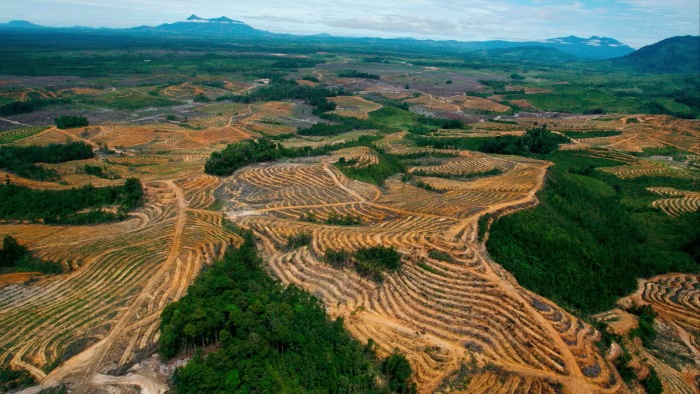Every country to be designated as standard risk to give them more time to adapt to regulation
FINANCIAL TIMES
8 de marzo, 2024
The EU intends to delay strict policing of imports from areas prone to deforestation after several governments in Asia, Africa and Latin America complained that the rules would be burdensome, unfair and scare off investors.
Brussels will put off classification of countries into low, standard or high risk, which was due to be implemented by December, instead designating every country as standard risk to give them more time to adapt to the anti-deforestation regulation, three EU officials told the Financial Times.
“We will simply not classify which means everywhere will be medium risk — we need more time to get the system in place,” said one official. “We have had a lot of complaints from partners. [The delay] means no country will have an advantage over another.”
The law, part of the EU’s flagship Green Deal, was passed last year and aims to reduce EU consumers’ role in cutting down woodland by barring imports including coffee, cocoa, palm oil and rubber that have been grown in deforested areas from being sold in the bloc.
But the regulation prompted ire from several developing nations that accused the EU of forcing its green standards on to others. Major palm oil producing countries including Indonesia and Malaysia raised “multiple concerns” over the rules in a letter to the European Commission in September.
“The legislation disregards local circumstances and capabilities, national legislation and certification mechanisms of developing producer countries, [as well as] their efforts to fight deforestation and multilateral commitments, including the principle of common but differentiated responsibilities,” it said.
Companies said they could pull out of “high-risk” areas because the burden of proving their products did not come from deforested land was too high, while several have started to favour supply deals with bigger producers that can afford to deploy sophisticated geolocation technology.
The law, which is a crucial part of Brussels’ plans to reach net zero emissions in the bloc by 2050, requires that importers provide geolocation data to prove their goods have not been sourced from areas affected by deforestation.
It was originally conceived as operating through a traffic light system that would classify countries as having a high, medium or low risk of deforestation. The system will use metrics such as the rate of land degradation and the expansion of agricultural activity as well as evidence from indigenous communities and NGOs.
The level of checks on imports will depend on the area of origin’s classification, with EU customs authorities tasked with checking 3 per cent of goods from medium-risk nations and 9 per cent from high-risk countries.
Products covered by the legislation include cattle, soyabeans and wood. Unchecked, EU demand for these imports would contribute about 248,000 hectares a year of deforestation by 2030, according to commission research.
In a further effort to placate developing countries, officials confirmed that Brussels would take a regional rather than a national approach, so the plains of southern Brazil would eventually be classified as lower risk than the Amazon region, where vast tracts of rainforest have been cleared. Brazil is a leading exporter of soyabeans and other agricultural commodities.
One EU official said slowing the classification process would not involve any legislative changes but was a “signal that we’re not planning to rush it”.
Developing countries are particularly incensed that the law was passed in June last year without clear guidance on how to comply. They highlighted issues such as the risk that hundreds of thousands of tonnes of coffee and cocoa beans could be destroyed.
Malaysia’s trade minister Zafrul Aziz said his country and others needed time and assistance to put in place control systems.
“You need time because it is costly to meet those standards, all those transparency or disclosure requirements,” he told the FT, adding that it would be “no issue” for big companies but many “smallholders” would struggle to comply.
He added that Kuala Lumpur was collaborating with Brussels on how to implement the law. The commission declined to comment.
Tomado de: https://www.ft.com/content/8dab4dc6-197b-4a2f-86f0-d5e83ce00b09

